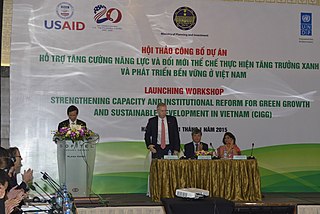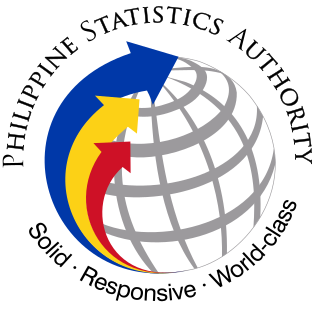The United Nations Development Programme (UNDP) is a United Nations agency tasked with helping countries eliminate poverty and achieve sustainable economic growth and human development. The UNDP emphasizes developing local capacity towards long-term self-sufficiency and prosperity.

The Department for International Development (DFID) was a department of HM Government responsible for administering foreign aid from 1997 to 2020. The goal of the department was "to promote sustainable development and eliminate world poverty". DFID was headed by the United Kingdom's Secretary of State for International Development. The position was last held between 13 February 2020 and the department's abolishment on 2 September 2020 by Anne-Marie Trevelyan. In a 2010 report by the Development Assistance Committee (DAC), DFID was described as "an international development leader in times of global crisis". The UK aid logo is often used to publicly acknowledge DFID's development programmes are funded by UK taxpayers.

Humanitarian aid is material and logistic assistance to people who need help. It is usually short-term help until the long-term help by the government and other institutions replaces it. Among the people in need are the homeless, refugees, and victims of natural disasters, wars, and famines. Humanitarian relief efforts are provided for humanitarian purposes and include natural disasters and human-made disasters. The primary objective of humanitarian aid is to save lives, alleviate suffering, and maintain human dignity. It may, therefore, be distinguished from development aid, which seeks to address the underlying socioeconomic factors which may have led to a crisis or emergency. There is a debate on linking humanitarian aid and development efforts, which was reinforced by the World Humanitarian Summit in 2016. However, the conflation is viewed critically by practitioners.

An aid agency, also known as development charity, is an organization dedicated to distributing aid. Many professional aid organisations exist, both within government, between governments as multilateral donors and as private voluntary organizations or non-governmental organisations. The International Committee of the Red Cross is the world's second oldest humanitarian organisation and is unique in being mandated by international treaty to uphold the Geneva Conventions. The Sovereign Order of Malta, established in 1099 as the Order of St. John of Jerusalem, has an unbroken tradition of over 900 years of hospitaller activities, continuing to this day. Even in its modern guise under international law, it was recognized at the Congress of Verona of 1822, and since 1834 headquartered in Palazzo Malta in Rome, decades before the Red Cross.
Official development assistance (ODA) is a category used by the Development Assistance Committee (DAC) of the Organisation for Economic Co-operation and Development (OECD) to measure foreign aid. The DAC first adopted the concept in 1969. It is widely used as an indicator of international aid flow. It refers to material resources given by the governments of richer countries to promote the economic development of poorer countries and the welfare of their people. The donor government agency may disburse such resources to the government of the recipient country or through other organizations. Most ODA is in the form of grants, but some is measured as the concessional value in soft (low-interest) loans.

Development aid is a type of foreign/international/overseas aid given by governments and other agencies to support the economic, environmental, social, and political development of developing countries. Closely related concepts include: developmental aid, development assistance, official development assistance, development policy, development cooperation and technical assistance. It is distinguished from humanitarian aid by aiming at a sustained improvement in the conditions in a developing country, rather than short-term relief. Development aid is thus widely seen as a major way to meet Sustainable Development Goal 1 for the developing nations.
Aid effectiveness is the degree of success or failure of international aid. Concern with aid effectiveness might be at a high level of generality, or it might be more detailed.

The United Nations Office for the Coordination of Humanitarian Affairs (OCHA) is a United Nations (UN) body established in December 1991 by the General Assembly to strengthen the international response to complex emergencies and natural disasters. It is the successor to the Office of the United Nations Disaster Relief Coordinator (UNDRO).

In international relations, aid is – from the perspective of governments – a voluntary transfer of resources from one country to another.

Capacity building is the improvement in an individual's or organization's facility "to produce, perform or deploy". The terms capacity building and capacity development have often been used interchangeably, although a publication by OECD-DAC stated in 2006 that capacity development was the preferable term. Since the 1950s, international organizations, governments, non-governmental organizations (NGOs) and communities use the concept of capacity building as part of "social and economic development" in national and subnational plans. The United Nations Development Programme defines itself by "capacity development" in the sense of "'how UNDP works" to fulfill its mission. The UN system applies it in almost every sector, including several of the Sustainable Development Goals to be achieved by 2030. For example, the Sustainable Development Goal 17 advocates for enhanced international support for capacity building in developing countries to support national plans to implement the 2030 Agenda.

The Philippine Statistics Authority is the central statistical authority of the Philippine government that collects, compiles, analyzes and publishes statistical information on economic, social, demographic, political affairs and general affairs of the people of the Philippines and enforces the civil registration functions in the country.

The Organisation for Economic Co-operation and Development's (OECD) Development Assistance Committee (DAC) is a forum to discuss issues surrounding aid, development and poverty reduction in developing countries. It describes itself as being the "venue and voice" of the world's major donor countries.
The Humanitarian Response Index (HRI) is an independent civil society initiative to annually assess and rank wealthy countries against their commitment to improve the quality and effectiveness of their humanitarian assistance. Developed by DARA, the HRI's intended purpose is to assist the Organisation for Economic Co-operation and Development's Development Assistance Committee (OECD/DAC) donor governments ensure that their humanitarian assistance has the greatest impact on beneficiaries. The HRI's aim is to improve the quality and effectiveness of aid, and promote greater efficiency, effectiveness, transparency and accountability of government donors. The first edition was published in 2007, followed by subsequent editions in 2008, 2009, and 2010.

Humanitarian Accountability Partnership International, established in 2003, was the humanitarian sector's first international self-regulatory body. A multi-agency initiative working to improve the accountability of humanitarian action to people affected by disasters and other crises, HAP members ranged from organisations with a mandate for emergency relief and development activities to institutional donors. The organisation aimed to strengthen accountability towards those affected by crisis situations and to facilitate improved performance within the humanitarian sector. The ultimate goal of the organisation was to uphold the rights and the dignity of crisis-affected populations across the world.
The International Aid Transparency Initiative (IATI) is a global campaign to create transparency in the records of how aid money is spent. The initiative hopes to thereby ensure that aid money reaches its intended recipients. The ultimate goal is to improve standards of living worldwide and globally reduce poverty. The IATI also publishes a standard to be used by organizations, allowing different datasets to be combined and shared.

Jorge Manuel Lopes Moreira da SilvaGOIH is a Portuguese engineer and politician of the Social Democratic Party serving as the Executive Director of the United Nations Office for Project Services, UNOPS, since 2023.

AidData is an Aid Transparency, Information Technology, Geocoding institute which was formed in March 23, 2009. Both its location and headquarters are in Williamsburg, Virginia.
Synergy International Systems, Inc. is an information technology and consulting company based in Washington, D.C. that provides web-based software to international development agencies, country governments, NGOs and private sector partners. The key products focused on monitoring and evaluation (M&E), national development effectiveness, and aid management, judicial system modernization, social protection, public financial management, disaster relief and reconstruction, environment, education, and public health. There is a company-maintained a global learning center in Yerevan, Armenia. The company's services include software development and customization, IT strategy consulting, systems integration, capacity development and technical support. Synergy has developed management information systems for public and private sector clients in 65 countries.











